Wendell Ashbaucher of Bluffton, IN
- At March 1, 2014
- By admin
- In Farm Life, Favorites, Generations, H.A.R.D. Lessons, Uncategorized
 0
0
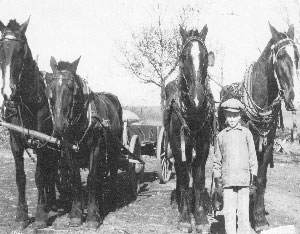
In the early 20th century, childhood deaths were common place in rural America and parents had to accept that some of their offspring would not survive. Influenza and farming accidents claimed many lives in those days. There were no antibiotics. Polio, measles and mumps were prolific. Farmers set their own broken bones and horses pulled the plows until they dropped dead in the field. Women baked bread, sewed for the family, made do, and tended large gardens full of cucumbers to be pickled, beets, turnips, carrots, potatoes and onions. Underground root cellars were thus filled and wheat that was threshed in July was ground into flour to bake breads, pie crusts and pancakes. There was a pig in the pen, a hen house filled with layers and fryers, and a cow for milk. Beef cattle and Percherons were rotated on pastures.
My great-grandma (Nancy Mabel Waugh) was born in 1892 . She lived on such an Indiana farm in the early 1900′s with her first husband, my great-grandfather, Wilhelm (William Edward) Ashbaucher. They were third generation settlers, at the brink of American ingenuity and prosperity. Henry Ford’s Model T was just rolling off the assembly line. Soon to follow would be Edison’s electric light bulb, indoor plumbing, and radio sets which could miraculously broadcast a Yankee’s baseball game or one of Jack Dempsey’s fights. Charles Lindbergh was learning to fly.
World War l was raging the year my grandfather, James William Ashbaucher, was born: 1917. By November, 1918, the war to end all wars would be over.
My whole life, I was told that Grandpa had a big brother, Will, who died one evening after being kicked in the head by a horse. He was seven years old. I was only six years old the first time I remember hearing the story. It has always bothered me: this little Will-boy who died without having had a chance to make his mark on the world. I have always loved him.
As I grew up, I would think about Will’s life on the farm. He was the only big brother my grandpa ever had and he certainly tagged along after him. By age 3, Grandpa was reaching under hen bellies to gather eggs while Will swept the hen house floor and freshened the nests. Both boys shared an oval, metal bath tub in the kitchen on Saturday nights. My great-grandma would heat the water on a stove top and both boys would strip down and get a good scrubbing. My Grandpa wore Will’s hand-me-downs until 1926. He was four years old then–the year that Wendell Waugh Ashbaucher “Will” was injured by the horse and killed.
Four years later, unexpectedly at age 38, their father (my great-grandfather) died too: leaving behind the farm, his wife (my great-grandma), and their two young children, my grandpa and, by then, a baby sister named Martha. That’s when my great-grandma’s world fell apart. She couldn’t care for her children and so sent them to live with two other families (temporarily) as she sold the farm, the livestock, the tools, and equipment. Martha was cared for in town and fared well. My grandpa, at age 4 or 5, went to live on another farm. He never spoke of that time, but it is generally understood that he had a hard life because the family was cruel. Great-grandma moved to town and grieved. Eventually she remarried a man named Glen Place, who was a railroad engineer, and brought the children back home to live with them. Grandpa Glen was much loved by all and worked for the Nickel Plate Railroad.
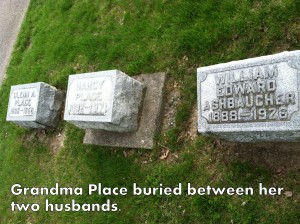 Today Grandma Place is buried between both husbands. She died in 1971.
Today Grandma Place is buried between both husbands. She died in 1971.
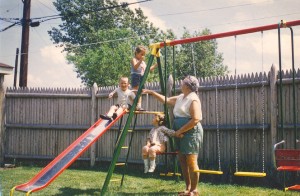 As a young girl growing up in Chicago, Grandma Place would come to visit. She was very old by the 1960′s, but would push me on a back yard swing. Later we would share some vanilla ice cream that my grandpa would hand crank in the cool of the shaded porch. She played a wicked game of pinochle, wore lots of perfume, and her eyes twinkled. She was a round, big hipped woman with frosty white hair and saggy, baggy cheeks that hung down. She was soft and beautiful. Once, she sewed me a dolly blanket from scraps and mailed it as a Christmas surprise. Now, when I get the patchwork blanket down from the shelf and look at the stitches she lovingly placed, precisely-spaced in rows, I wonder…
As a young girl growing up in Chicago, Grandma Place would come to visit. She was very old by the 1960′s, but would push me on a back yard swing. Later we would share some vanilla ice cream that my grandpa would hand crank in the cool of the shaded porch. She played a wicked game of pinochle, wore lots of perfume, and her eyes twinkled. She was a round, big hipped woman with frosty white hair and saggy, baggy cheeks that hung down. She was soft and beautiful. Once, she sewed me a dolly blanket from scraps and mailed it as a Christmas surprise. Now, when I get the patchwork blanket down from the shelf and look at the stitches she lovingly placed, precisely-spaced in rows, I wonder…
I wonder how she bore the loss of a child and a husband. I wonder if she thought of them in the twilight hours of her life as she pieced together my blanket. I hope making the blanket gave her comfort. I can not touch the blanket without thinking of how she overcame all that sorrow. She went on to live a happy, retired life in sunny Florida where she rode a three wheeled bicycle and enjoyed the sun’s heat and shine by the pool. Later, Martha would join her.
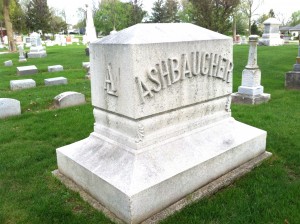 One hundred years later, in 2013, my cousin, Sandy, and I were camping
One hundred years later, in 2013, my cousin, Sandy, and I were camping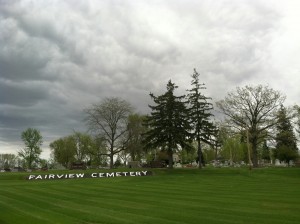 near Bluffton and on a lark I said, “Hey, why don’t we find out where the cemetery is and see if we can find any Ashbauchers.” We googled it and discovered that there were four cemeteries nearby. By divine intervention, we picked the right one, Fairview Cemetery.
near Bluffton and on a lark I said, “Hey, why don’t we find out where the cemetery is and see if we can find any Ashbauchers.” We googled it and discovered that there were four cemeteries nearby. By divine intervention, we picked the right one, Fairview Cemetery.
My secret hope was to find Wendell. I wanted to tell him (my great-uncle!) that he was not forgotten and that I loved his little brother, my grandpa, with all of my heart.
SANDY AND I FOUND MORE THAN OUR ROOTS THAT DAY…We found a story.
To be Continued….
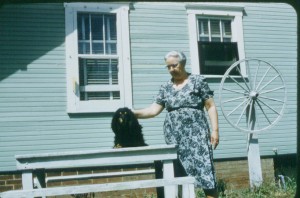
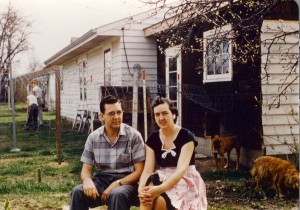
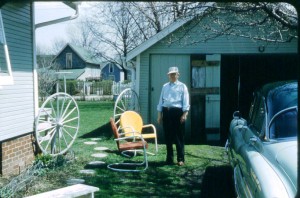
 Dairy Air
Dairy Air